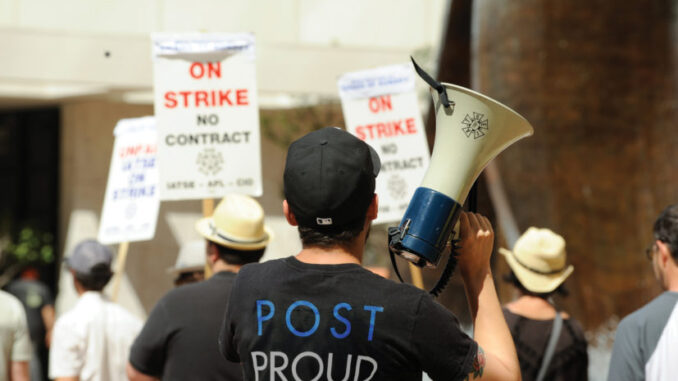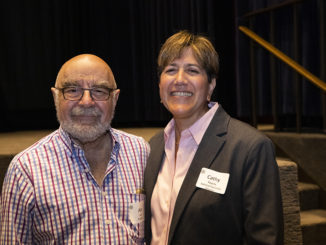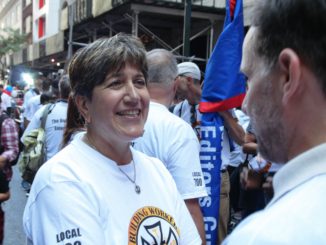
by A.J. Catoline
In its campaign to organize non-union employers, the Editors Guild has many tools and tactics. In some instances, employees withhold their labor in order to convince non-union employers to agree to union deals. Our “recognition strikes” — job actions to bring non-union employers to the bargaining table — generally do not last long, although during a recent protracted walkout, the Guild dusted off an old playbook in order to aid those who lost wages: a Strike Relief Fund.
Last fall, the post crew of the Bravo reality series Shahs of Sunset demanded union representation and an IATSE contract, and shut down work on the show when the employer failed to respond. What distinguished the Shahs strike from other such actions was its length. It became the longest post-led strike in recent history at exactly 30 days— September 10 to October 10. The job action manifested itself not only as sidewalk picket lines in front of Bravo’s offices, parent company NBCUniversal and production entity Ryan Seacrest Productions in LA during a record heat wave, but also turned up the temperature outside the first two companies’ corporate headquarters at Rockefeller Center in New York.
“We know how to win strikes quick, and we know how to win them long”
When the strike began with 16 editors and assistant editors — some Guild members and some not — deciding they wanted the same health-care and pension benefits afforded to their colleagues working in scripted television and other post- production areas of the industry, the mood was optimistic, recalls picture editor Mark Bement, a member of the striking crew.
Although aware that striking entails uncertainties and risks, the Shahs crew of course had hoped their strike would yield immediate results. “A month earlier, the Survivor strike lasted less than a day,” Bement says. “We were hoping for a similar quick resolution for a contract.”
The Guild’s National Organizer, Rob Callahan, remembers the speed with which Survivor, having run more than 20 seasons without being covered by an IATSE contract, finally signed a deal with the post crew who courageously walked off the job. “Most of our recognition strikes, whether prosecuted in coordination with our sister IATSE locals or whether led by post crews, are very short,” he says. “A lot of them are so short they are over before anyone even knows they’ve started. Sometimes, they can drag on for a few days — though Survivor was over in about five hours.”
In Bravo’s case, management dug in and refused to negotiate, so it soon became clear this fight would drag on longer than previous struggles. “As a few days turned into a week, two weeks, and time wore on,” recounts Bement, “we started to get concerned — especially for the folks with families and mortgages to pay.” Not only had the strikers lost their paychecks; state laws prevented them from collecting unemployment benefits during the walkout.
Though it had fallen into disuse and obscurity, the Guild actually had a little-known Strike Relief Fund policy, enacted two decades earlier by the Board of Directors in November 1994. Because recent job actions had been of relatively short duration, there had been no occasion to invoke the long-dormant policy, which provides payment to substitute what a Guild member could collect in the maximum equivalent of state unemployment compensation (currently $450 per week in California, $420 per week in New York). The Guild was eager to bring this policy out of hibernation to provide some relief to the Shahs strikers, but discovered there was a flaw.
As written, the 20-year-old policy would allow funds to aid active Guild members only, and not those who are not yet members of the Guild, let their status become inactive, or became suspended for late payment of dues. Several of the members of the striking Shahs of Sunset crew were not active Guild members. These people had risked so much to help the union by striking, but the Guild could not immediately provide any relief or payments to them.
Changing the existing policy required approval of the Guild’s Board of Directors, which next met October 18. The Shahs crew, which won the strike a week earlier and ratified an IATSE contract, attended the meeting and were greeted with a standing ovation.
At the meeting, a motion was made “…to amend the existing strike relief payment policy to include inactive and active members, and all non-members, participating in a strike action. The payments will be commensurate with the state’s maximum unemployment weekly rate in which the strike occurs, for a maximum of eight weeks.” Benefits end when a member finds substitute employment.
And what if a strike goes longer than eight weeks? The Board left options for future review “to include applying the policy at the discretion of the National Executive Director and the President…” In acknowledgement of the recently concluded job action, a separate motion made “this amended policy retroactive so it covers the crew of Shahs of Sunset.” The Guild would take care of those who stood up to make better change in the workplace for all of us.
The motions passed by unanimous votes. In amending the Strike Relief policy, the Board sent a clear message that the Guild is prepared to make an investment in the future of a united community of post-production professionals, regardless of membership, including many who are hopeful about joining a union that looks after their interests.
“The fact that the Board voted to give relief to non-members of the striking crew was just a huge statement of support,” Bement says. “Now if people are thinking about organizing, and they are not Guild members, they know there is relief if things drag on for a long time; they know the union has their back.”
“When folks put themselves on the line to improve their jobs, it’s essential that we close ranks to support and defend them,” says Callahan. “The strike relief checks, funded by members’ dues, provide critical monetary assistance when strikers’ wages stop coming. But the actions that individual members take in support of strikers are even more key to maintaining the toughness necessary to win a hard fight. Hundreds of small gestures of solidarity combined to form a force greater than the employers’ recalcitrance.”
“We know how to win strikes quick, and we know how to win them long,” Bement offers. Having proven to employers that our union has the stamina to win a difficult fight, the Guild sent a powerful message that our members can overcome management’s resistance.





